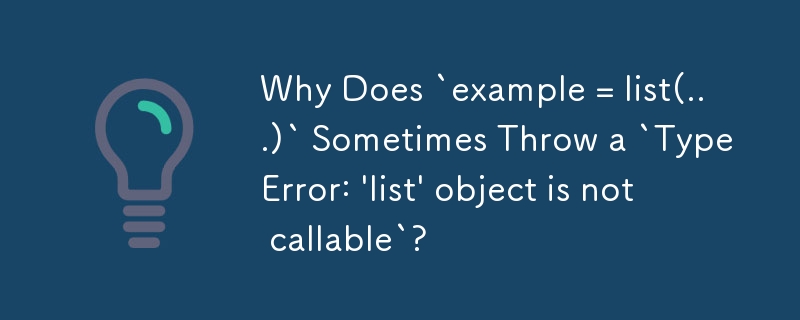 Backend Development
Backend Development
 Python Tutorial
Python Tutorial
 Why Does `example = list(...)` Sometimes Throw a `TypeError: 'list' object is not callable`?
Why Does `example = list(...)` Sometimes Throw a `TypeError: 'list' object is not callable`?
Why Does `example = list(...)` Sometimes Throw a `TypeError: 'list' object is not callable`?

Why Does "example = list(...)" Result in "TypeError: 'list' Object Is Not Callable"?
At the REPL, when you attempted the code "example = list('easyhoss')", expecting the example variable to hold a list of characters from the string, you encountered the error: "TypeError: 'list' object is not callable".
This occurs because you inadvertently overwrote the built-in Python class "list" with an instance of a list. When you referenced "list" later in "example = list('easyhoss')", Python interpreted it as the instance, which cannot be called.
To understand this, we must explore Python's namespace and scoping mechanisms.
Namespaces: Python uses nested namespaces to store object names (including classes and functions). Each module has its own namespace, including built-in functions and classes.
Scoping: When referencing a name, Python checks the local namespace first. If not found, it moves up to higher-level namespaces until it locates the name or encounters no further namespaces (resulting in a NameError).
In your case, you unknowingly assigned an instance of "list" to the global "list" variable:
example = list('easyhoss') # "list" refers to the built-in class
list = list('abc') # Creates a "list" variable referencing an instance of "list"
example = list('easyhoss') # "list" refers to the instance, resulting in the errorThis overwriting hides the built-in "list" class, causing the "TypeError."
To avoid this error, use IDEs like PyCharm or Atom with Python plugins that highlight name shadowing.
Additional Considerations:
- "list" is a callable class that triggers instance creation.
- Instance of "list" (list[]) are not callable.
- For more information on classes and instances, refer to the Python documentation.
When you launch an interactive Python session, you create a temporary module with its own namespace, which can also impact namespace behavior.
The above is the detailed content of Why Does `example = list(...)` Sometimes Throw a `TypeError: 'list' object is not callable`?. For more information, please follow other related articles on the PHP Chinese website!

Hot AI Tools

Undresser.AI Undress
AI-powered app for creating realistic nude photos

AI Clothes Remover
Online AI tool for removing clothes from photos.

Undress AI Tool
Undress images for free

Clothoff.io
AI clothes remover

AI Hentai Generator
Generate AI Hentai for free.

Hot Article

Hot Tools

Notepad++7.3.1
Easy-to-use and free code editor

SublimeText3 Chinese version
Chinese version, very easy to use

Zend Studio 13.0.1
Powerful PHP integrated development environment

Dreamweaver CS6
Visual web development tools

SublimeText3 Mac version
God-level code editing software (SublimeText3)

Hot Topics
 1376
1376
 52
52
 How to solve the permissions problem encountered when viewing Python version in Linux terminal?
Apr 01, 2025 pm 05:09 PM
How to solve the permissions problem encountered when viewing Python version in Linux terminal?
Apr 01, 2025 pm 05:09 PM
Solution to permission issues when viewing Python version in Linux terminal When you try to view Python version in Linux terminal, enter python...
 How to efficiently copy the entire column of one DataFrame into another DataFrame with different structures in Python?
Apr 01, 2025 pm 11:15 PM
How to efficiently copy the entire column of one DataFrame into another DataFrame with different structures in Python?
Apr 01, 2025 pm 11:15 PM
When using Python's pandas library, how to copy whole columns between two DataFrames with different structures is a common problem. Suppose we have two Dats...
 What are some popular Python libraries and their uses?
Mar 21, 2025 pm 06:46 PM
What are some popular Python libraries and their uses?
Mar 21, 2025 pm 06:46 PM
The article discusses popular Python libraries like NumPy, Pandas, Matplotlib, Scikit-learn, TensorFlow, Django, Flask, and Requests, detailing their uses in scientific computing, data analysis, visualization, machine learning, web development, and H
 How does Uvicorn continuously listen for HTTP requests without serving_forever()?
Apr 01, 2025 pm 10:51 PM
How does Uvicorn continuously listen for HTTP requests without serving_forever()?
Apr 01, 2025 pm 10:51 PM
How does Uvicorn continuously listen for HTTP requests? Uvicorn is a lightweight web server based on ASGI. One of its core functions is to listen for HTTP requests and proceed...
 How to teach computer novice programming basics in project and problem-driven methods within 10 hours?
Apr 02, 2025 am 07:18 AM
How to teach computer novice programming basics in project and problem-driven methods within 10 hours?
Apr 02, 2025 am 07:18 AM
How to teach computer novice programming basics within 10 hours? If you only have 10 hours to teach computer novice some programming knowledge, what would you choose to teach...
 How to dynamically create an object through a string and call its methods in Python?
Apr 01, 2025 pm 11:18 PM
How to dynamically create an object through a string and call its methods in Python?
Apr 01, 2025 pm 11:18 PM
In Python, how to dynamically create an object through a string and call its methods? This is a common programming requirement, especially if it needs to be configured or run...
 How to handle comma-separated list query parameters in FastAPI?
Apr 02, 2025 am 06:51 AM
How to handle comma-separated list query parameters in FastAPI?
Apr 02, 2025 am 06:51 AM
Fastapi ...
 What are regular expressions?
Mar 20, 2025 pm 06:25 PM
What are regular expressions?
Mar 20, 2025 pm 06:25 PM
Regular expressions are powerful tools for pattern matching and text manipulation in programming, enhancing efficiency in text processing across various applications.



